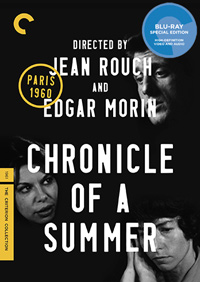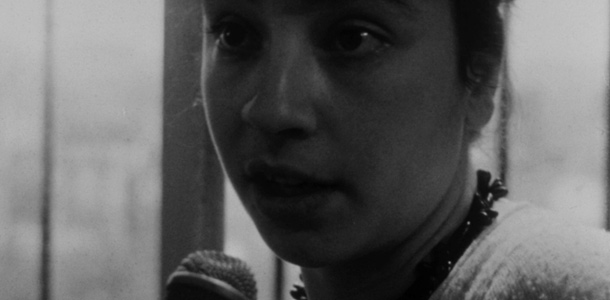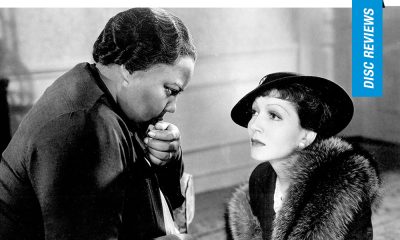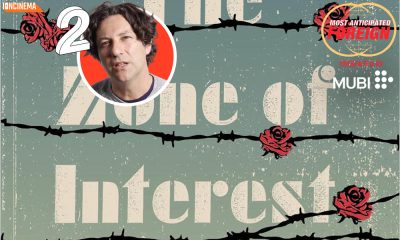Disc Reviews
Criterion Collection: Chronicle of a Summer | Blu-ray Review
 1961’s Chronicle of a Summer is generally credited with inspiring what became known as Cinéma-vérité; a style of narrative filmmaking that both copied and utilized techniques of documentary production to create films of heightened realism. Of course, documentaries have been around as long as motion picture cameras but in the first half of the 20th century the genre’s chief subjects were exotic travelogues and political propaganda. Chronicle of a Summer was one of the first documentaries with the stated aim of capturing the lives and interactions of “real people,” and gaining a clearer understanding of the public mood through random sampling.
1961’s Chronicle of a Summer is generally credited with inspiring what became known as Cinéma-vérité; a style of narrative filmmaking that both copied and utilized techniques of documentary production to create films of heightened realism. Of course, documentaries have been around as long as motion picture cameras but in the first half of the 20th century the genre’s chief subjects were exotic travelogues and political propaganda. Chronicle of a Summer was one of the first documentaries with the stated aim of capturing the lives and interactions of “real people,” and gaining a clearer understanding of the public mood through random sampling.
Not surprisingly, Chronicle of a Summer was conceived by two men who valued science over aesthetics: sociologist Edgar Morin and anthropologist Jean Rouch. While Rouch had spent a decade documenting tribal life in Africa through a series of influential short films, Morin was a novice at filmmaking. Their innocent, somewhat clunky vision of a social documentary of contemporary Parisian life was brought to reality, and greatly enhanced, by the addition of Canadian cinematographer Michel Brault. Brault had shot a number gritty slices of life for the National Film Board of Canada, and these films had served as an inspiration to Morin and Rouch. Together, the trio slowly made their way through the dense human jungles of Paris, often working at cross purposes and blazing their own cinematic trails. Chronicle of a Summer was new type of film, and its birth was neither easy nor painless.
In the early going, we see Morin and Rouch enlisting the aid of a professional interviewer named Marceline, who works in the field of applied psychology. Through an ever present Gauloise haze, one sees that Marceline bears a death camp tattoo on her elbow, a detail that will figure prominently over the course of the film. Marceline soon hits the Parisian streets, microphone in hand, asking passersby the probing question “Are you happy?” Marceline also visits respondents in their homes and eventually the film’s central core of human lab rats is assembled, featuring an artistic couple who long for a carefree life in the Camargue, a paranoid Italian immigrant who’s sure his bosses at the Renault factory are out to get him, a transplanted Algerian overwhelmed by European prosperity and a highly emotional young woman who uses her interviews as therapy sessions.
Despite the emphasis on science — or pseudo science in this case — Chronicle of a Summer offers a few visual delights thanks to Brault’s seasoned eye. Street scenes of the funky, bohemian Paris of 1960 — back when one didn’t need a lavish trust fund to live in a low numbered arrondissement — have an electric sense of excitement and possibility. Brimming with cool culture and sexual enlightenment, the Paris of 1960 was an existential playground for young moderns, even if most of the film’s subjects tend to be consumed by excessive ennui. The city’s architecture and historical landmarks become mute but pivotal characters and their beauty seems even more imposing rendered in the film’s velvety black and white. And speaking of science, Brault’s long shots of quirky Left Bank streets buzzing with traffic prove one theory irrefutably: the Citroen of this era was a butt-ugly automobile.
Disc Review
The transfer was struck from a restoration performed by the Cineteca di Bologna in 2011 and supervised by cinematographer Michel Brault, with impressive results. The monochrome is full and lush, with just enough grain to remind us of the film’s 16mm origins. The French b/w films of this era have an unusual crisp yet murky look to them — particularly effective for capturing ghostly images of Parisian architecture — and the transfer retains those unique characteristics. The disc presents in the original aspect of 1.37:1.
The restored monaural track is perfectly acceptable, especially considering the rumored difficulties the production had with its Nagra. The mix is well balanced with just enough ambiance to keep it real.
Un été + 50 (2011), a seventy-three-minute documentary featuring outtakes and new interviews with co-director Edgar Morin and some of the film’s subjects
Directed by Florence Dauman, this supplement gives viewers a thorough grounding in the film’s genesis, and offers almost enough outtakes to make a Chronicle of a Summer II. Additional commentary is offered by film scholar Raymond Bellour, along with insights from nonagenarian Edgar Morin, who originally wanted the film to be titled Rotten Summer. Preparation of the survey questions is discussed at length and there are recollections from surviving cast members. It’s interesting to see how these folks have fared over the intervening fifty years, and a number of them note how the film captured their generation’s unrest, ultimately expressed in the riots of 1968.
Archival interviews with codirector Jean Rouch and Marceline Loridan, one of the film’s subjects
Rouch’s interview is from a 1962 French TV program, with an emphasis on his anthropological films made in Africa. The director offers his impressions on the New Wave movement in filmmaking and its relationship to documentary production. 6 minutes.
Loridan was filmed at Cannes in 1961, and her commentary is both revealing and poignant. Her interviewer tries to steer the conversation to her experiences in Auschwitz and, despite some early resistance, Loridan eventually consents. The trial of Adolph Eichmann was going on in Israel at the time, giving Loridan a wealth of new information on the practices of her tormentors. From both a historical and emotional standpoint, the piece is a fascinating seven minutes.
New interview with anthropology professor Faye Ginsburg, organizer of several Rouch retrospectives
Rouch scholar Ginsburg speaks with great authority and admiration about the late director and delivers a thorough background on his expeditions in Africa. She also details innovative aspects of Chronicle of a Summer, describing the film as completely devoid of cinema’s artificial aspects. According to Ginsburg, Rouch underestimated the difficulty in capturing the truth about his Parisian subjects, despite revealing every step of the filmmaking process. The supplement is a concise and informative 15 minutes.
A booklet featuring an essay by scholar Sam Di Iorio
This 34 page publication offers numerous production stills, a review of the film’s subjects and notes on the transfer. Di Iorio’s essay is an unusually frank piece of film scholarship, noting how the basic human traits of insincerity and jealousy hampered the filmmakers in their attempt to create objective portraits of modern life.
Final Thoughts
For all their dispassionate interest in science, here Morin and Rouch do what film producers often do in the middle of shooting: panic and meddle. The scientific method is largely abandoned as they begin to tinker and introduce contrived situations designed to exploit their subjects. A meet-and-greet and a pointless field trip to St. Tropez are brought into the mix, negating any idea of documenting the day-to-day lives ordinary Parisians. As a result Chronicle of a Summer ultimately ceases to live up to its name and becomes little more than an elaborate home movie of some rather uninteresting people. The most memorable sequence, Marceline’s memory laden walk through Place de Concorde, completely turns the table as the observer becomes the observed. Chronicle of a Summer undoubtedly was an influence on La Nouvelle Vague but chiefly as an illustration of the stylistic possibilities of small crews and lightweight equipment, not necessarily of new methods of storytelling. It will be of interest to enthusiastic film historians. However, to casual viewers the pertinent question will not be “Are you happy?” but “Are you awake?”



































